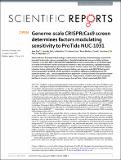Files in this item
Genome-scale CRISPR/Cas9 screen determines factors modulating sensitivity to ProTide NUC-1031
Item metadata
| dc.contributor.author | Sarr, Awa | |
| dc.contributor.author | Bré, Jennifer | |
| dc.contributor.author | Um, In Hwa | |
| dc.contributor.author | Chan, Tsz Huen | |
| dc.contributor.author | Mullen, Peter | |
| dc.contributor.author | Harrison, David J. | |
| dc.contributor.author | Reynolds, Paul A. | |
| dc.date.accessioned | 2019-05-22T09:56:16Z | |
| dc.date.available | 2019-05-22T09:56:16Z | |
| dc.date.issued | 2019-05-21 | |
| dc.identifier | 258893627 | |
| dc.identifier | 6899297e-3d19-4bb8-bc84-776966d606f2 | |
| dc.identifier | 85066088455 | |
| dc.identifier | 000468423600015 | |
| dc.identifier.citation | Sarr , A , Bré , J , Um , I H , Chan , T H , Mullen , P , Harrison , D J & Reynolds , P A 2019 , ' Genome-scale CRISPR/Cas9 screen determines factors modulating sensitivity to ProTide NUC-1031 ' , Scientific Reports , vol. 9 , 7643 . https://doi.org/10.1038/s41598-019-44089-3 | en |
| dc.identifier.issn | 2045-2322 | |
| dc.identifier.other | ORCID: /0000-0001-8738-1245/work/57821645 | |
| dc.identifier.other | ORCID: /0000-0001-9041-9988/work/64034359 | |
| dc.identifier.other | ORCID: /0000-0002-0841-609X/work/157141026 | |
| dc.identifier.uri | https://hdl.handle.net/10023/17738 | |
| dc.description | A.S. is the recipient of a Medical Research Scotland PhD Studentship awarded to P.A.R. Edinburgh Genomics is partly supported through core grants from Natural Environment Research Council (R8/H10/56), Medical Research Council (MR/K001744/1) and Biotechnological and Biological Research Council (BB/J004243/1). Publication of this article was funded in part by the University of St Andrews Open Access Publishing Fund. | en |
| dc.description.abstract | Gemcitabine is a fluoropyrimidine analogue that is used as a mainstay of chemotherapy treatment for pancreatic and ovarian cancers, amongst others. Despite its widespread use, gemcitabine achieves responses in less than 10% of patients with metastatic pancreatic cancer and has a very limited impact on overall survival due to intrinsic and acquired resistance. NUC-1031 (Acelarin), a phosphoramidate transformation of gemcitabine, was the first anti-cancer ProTide to enter the clinic. We find it displays important in vitro cytotoxicity differences to gemcitabine, and a genome-wide CRISPR/Cas9 genetic screening approach identified only the pyrimidine metabolism pathway as modifying cancer cell sensitivity to NUC-1031. Low deoxycytidine kinase expression in tumour biopsies from patients treated with gemcitabine, assessed by immunostaining and image analysis, correlates with a poor prognosis, but there is no such correlation in tumour biopsies from a Phase I cohort treated with NUC-1031. | |
| dc.format.extent | 13 | |
| dc.format.extent | 10164731 | |
| dc.language.iso | eng | |
| dc.relation.ispartof | Scientific Reports | en |
| dc.subject | Gemcitabine | en |
| dc.subject | Pancreatic cancer | en |
| dc.subject | CRISPR–Cas9 | en |
| dc.subject | Genome-wide screen | en |
| dc.subject | Resistance | en |
| dc.subject | RC0254 Neoplasms. Tumors. Oncology (including Cancer) | en |
| dc.subject | NDAS | en |
| dc.subject | SDG 3 - Good Health and Well-being | en |
| dc.subject.lcc | RC0254 | en |
| dc.title | Genome-scale CRISPR/Cas9 screen determines factors modulating sensitivity to ProTide NUC-1031 | en |
| dc.type | Journal article | en |
| dc.contributor.sponsor | Medical Research Scotland | en |
| dc.contributor.institution | University of St Andrews. School of Medicine | en |
| dc.contributor.institution | University of St Andrews. Cellular Medicine Division | en |
| dc.contributor.institution | University of St Andrews. Sir James Mackenzie Institute for Early Diagnosis | en |
| dc.contributor.institution | University of St Andrews. Centre for Biophotonics | en |
| dc.contributor.institution | University of St Andrews. Biomedical Sciences Research Complex | en |
| dc.identifier.doi | 10.1038/s41598-019-44089-3 | |
| dc.description.status | Peer reviewed | en |
| dc.identifier.grantnumber | en |
This item appears in the following Collection(s)
Items in the St Andrews Research Repository are protected by copyright, with all rights reserved, unless otherwise indicated.

